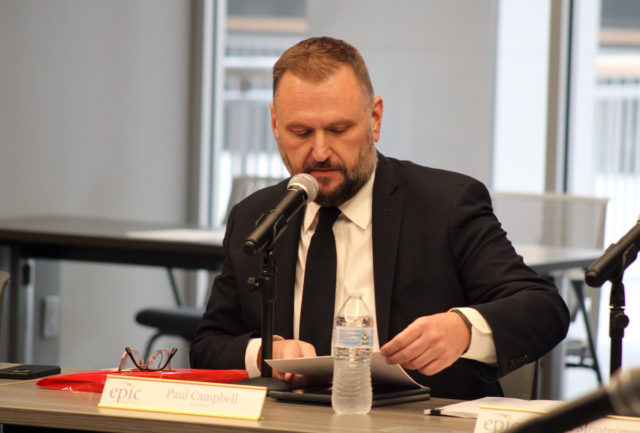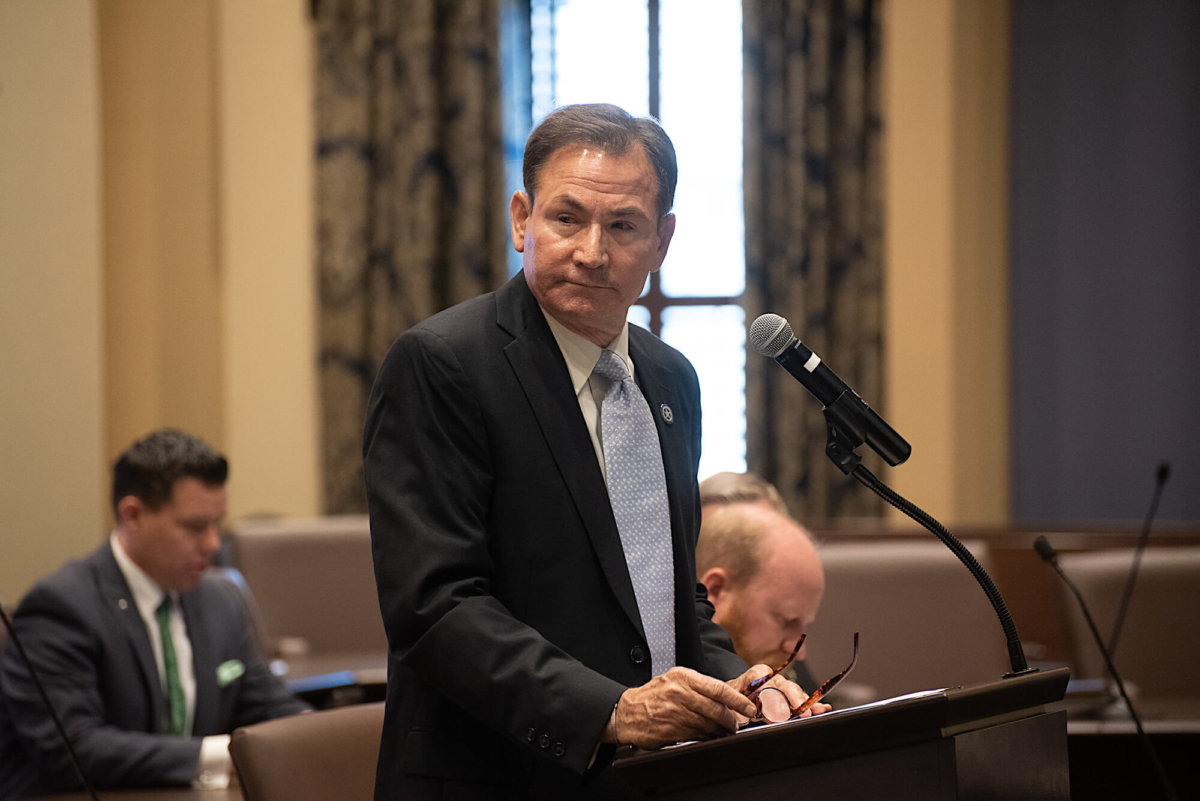

Epic Charter School board members approved a payment to settle litigation with former Sen. Ron Sharp (R-Shawnee) during their first meeting as a consolidated school district Wednesday night. Both developments underscore the ongoing changes at Epic, Oklahoma’s largest virtual charter school that has been embroiled in drama for years.
“It takes a tremendous amount of administrative work on this team trying to navigate two school districts when we were always operating as one,” board President Paul Campbell said of Epic’s consolidation. “This is a really big day for the school.”
Epic received a letter from State Superintendent of Public Instruction Joy Hofmeister approving the consolidation July 8. Epic board members had previously approved the consolidation of the Epic One-on-One and Epic Blended districts at a March board meeting, pending approval by the State Department of Education.
During the March meeting, Epic Superintendent Bart Banfield told board members the move to consolidate could result in $4 million to $8 million in savings owing to lower charter authorization fees, fewer technology fees and personnel time savings and efficiencies. The Statewide Virtual Charter Schools Board will be the charter authorizer for the merged Epic district. Previously, Rose State College operated as the charter authorizer for Epic Blended.
Wednesday night also marked the board’s first meeting since the OSDE released a 76-page investigative report outlining alleged attendance fraud, Open Meeting Act violations and “improper, unapproved and excessive bonuses” paid to Banfield. (Those issues are separate from the recent charges filed against former Epic leaders Ben Harris and David Chaney.)
During a June press conference outlining the new report about Epic issues, Hofmeister said she would recommend placing Epic’s accreditation on probation at the state board’s July 28 meeting.
Sheila Moore handles communications for Epic, and she told NonDoc that the charter school district is preparing a response to the OSDE report. Board members also addressed the situation.
“I want to be sure that we provide the (state) board members with whatever context and other facts they feel like they need, and we want to be sure that we provide it in a manner that’s really digestible and that you can understand what happened with a timeline,” board member Ginger Casper said. “This is a 10-year saga, and it’s hard to carve out who did what when.”
Casper said Epic also wants to dissect the OSDE report to improve board and district practices.
“We want to be sure that we’re following all the rules and being very transparent,” Casper said.
Board approves payment up to $600,000

During the evening’s meeting, board members also approved a motion that would provide payment to former Sen. Ron Sharp in an amount up to $600,000 related to a libel and slander lawsuit from 2019.
Epic executive director of legal services Brandon Webb told the board that Oklahoma County District Court Judge Brent Dishman signed the journal entry of judgement on the case Tuesday.
Dishman ruled that Epic must pay Sharp an amount of $500,000 and attorney fee awards of nearly $36,000, with judgement interest included as well.
“I would recommend that the board approve payment in the amount up to $600,000,” Webb told board members. “If this gets approved tonight, we will try to pay Mr. Sharp tomorrow or this week. Interest is calculated until we pay, so that’s why we have ‘an amount up to.’ Hopefully we can get this settled tomorrow.”
Epic had sued Sharp in December 2019 for libel and slander after Sharp had been publicly critical of the charter schools, alleging the schools had inflated student enrollment numbers and misused taxpayer dollars.
Oklahoma County District Court Judge Cindy Truong had dismissed the lawsuit in February 2020, later fining Epic $500,000 under the Oklahoma Citizens Participation Act, which outlines sanctions for filing meritless lawsuits. Epic had previously planned to appeal the fine with the Oklahoma Supreme Court until the board voted to drop the appeal to the lawsuit at their March meeting.
“On behalf of the school, I wanted to apologize to him for what he went through,” said Campbell, whose time on the board has coincided with many of Epic’s reforms and staffing changes.
OSDE requests court to remove of Western Heights Board president
Another district that has found itself crossways with the State Department of Education had action taken against it on Wednesday.
The Oklahoman reported Wednesday evening that the OSDE filed a 282-page request in Oklahoma County District Court asking that a judge remove long-time Western Heights Public Schools Board president Robert Everman from his position after a repeated failure to address the district’s Fiscal Year 2020-2021 audit.
Everman has been on the Western Heights board since 1997 and has served as chairman since 2019.
OSDE also requested that a $500 fine be issued against members of the board who have continued to reject the state’s control of the district.
The State Board of Education voted to take control of the troubled school district at their meeting in July 2021 after expressing the “utmost concern” about district operations at prior meetings. A writ of mandamus was issued by Oklahoma County District Court Judge Aletia Timmons in August stating Western Heights must acknowledge the authority of the state board to oversee the district’s day-to-day operations.
The audit, which was originally obtained and reported on by News 9 in June, contains 19 significant deficiencies, including employees being under and overpaid, a lack of internal controls for federal program revenue and expenditure reporting, and an unauthorized $25,000 bonus paid to suspended district Superintendent Mannix Barnes.
Everman and Western Heights Schools Board Attorney Jerry Colclazier had prevented the presentation of the audit at previous board meetings held on June 13, June 30 and July 11.
Court documents state that “in recent history, under the leadership of Everman and Barnes, the audits reveal poor management of public funds and poor decision making by public officials.”
According to state law, school districts have 30 days after a yearly audit’s completion to file it with the OSDE and the State Auditor & Inspector’s Office, with the failure to do so jeopardizing state funding. Western Height’s audit report was completed by CPA Kerry John Patten May 31 and was due to the OSDE on June 30.
An investigative audit of the Western Heights district is being conducted by the State Auditor & Inspector’s Office.




















